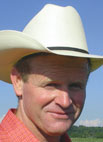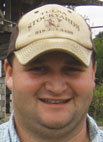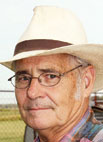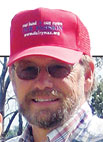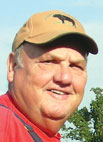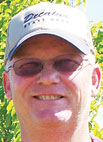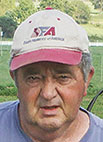The Good In A Longhorn
Walking through a pasture of Texas Longhorns could be quite intimidating. Whether straight or curved, the horns are long and threatening, and the animals are huge. But then the owner calls them by their names and scratches their heads, and suddenly they’re not as unapproachable. It’s hard to be afraid of a cow named Nancy Jane, Little John, Get ‘er Done, Deadeye Dick – and the best one – Princess Margaret.
Farming Bonds
A lot of farmers don’t look forward to the times that they have to work their cattle. That’s not the case for Randal Bonds of Cecil, Ark. In fact, he even does it for other farmers all over the Franklin County area. He uses his team of Catahoula dogs and a horse to quickly accomplish a task that takes hours for some. Often, it only takes Randal 10 to 20 minutes to gather a herd that is used to being driven by horses and around an hour for those that aren’t. “My dogs gather the cattle up, and then I use the horses to drive them to where they need to be, he explained.”
A New Venture
The fourth generation in the cattle business, Lane Pruitt who lives at Clinton, Ark., has worked with cattle as far back as he can remember. He grew up on a dairy farm, working with his grandfather, Larry Pruitt, who lives at Beebe, Ark. Larry, a veteran cattleman, has worked in the livestock industry his whole life. Lane continued working with Larry on the family farm through his college years at Arkansas State at Beebe, where he graduated with a Bachelors Degree in Agricultural Business.
Raising Champion Foxtrotters
Currently J.W., Belle
and Andrew Hendrix have 50 Foxtrotter horses on their 700-acre Boston Mountain Foxtrotter Ranch near Witts Springs, Ark. When J.W. was 4 years old his family moved from near Bass, Ark., on the Buffalo River to Witts Springs in order for the children to attend school. He has lived at that location since; some of the property is the original home place that once belonged to his dad. J.W. has been involved in cattle and horses for many years.
Honing Heritage
The eastern Oklahoma farm of Arlus Walters gives the feeling you’ve stepped back in time to a simpler place. No strip malls, no gas stations, just the small community church right up the road. That is how Arlus Walters prefers things.
Adapt Then Expand
Rush hour traffic, city ordinances and people trying to arrive at the airport on time. Every day hustle and bustle may not concern most Arkansas farmers; however, it is a major concern for Ryan Anglin who owns and operates a 300-cow dairy and runs 150 pairs of beef cattle on 1,100 acres with his family outside of Bentonville. Ryan, who has been in the dairy business for 37 years, has learned how to adapt to the ever-changing Northwest Arkansas.
Answering the Demand for Lim-Flex
White, black and red signs mark O’Neal Limousin Farm as it stretches along on both sides of Scenic Highway 23 through Branch, Ark. Just behind the home of Gary and Beth O’Neal, black Limousin cattle pepper the hillside grazing on grass made green by the unusual July rains. Their home overlooks a large pond and the pastures where they keep heifers and weaning calves. “I keep the first year heifers up here to give them a little extra care the first three or four months of their pregnancy," Gary said. “Spoiled is what they are,” laughed Beth. “Yes, they are spoiled,” Gary admitted, “but that’s okay.”
The Farm Network
Dwight Carney has been around cattle all his life. After working for Walmart for a number of years and helping his father with his cattle, he decided to start building his own herd. Dwight and his wife Debbie now own 1,000 acres near Cane Hill, Ark., and have 150 cows as well as their home in Fayetteville on 90 acres. They have three children, a son and two daughters who still live in the area. “The farm in Fayetteville is just a play farm,” he said. “We raise cattle, mix our own feed and bale hay at (the Cane Hill) place.” Dwight used to raise Limousin. “But, we now raise Angus and cross them with black Limousin bulls,” Dwight said.
Good Sense and Good Cattle
The red and white flowers of the crepe myrtles lining the road through Winningham Farms provide a hint of what you will find out in their pastures. For the past three years, Doyce and Peggy Winningham have been raising registered Polled Hereford cattle on their 500-acre farm located near Center Ridge, Ark., in Conway County. The Winninghams have found Hereford cattle to be just the right fit for their operation, and when it comes to farming you might say that the Winninghams have just about done it all.
Easy Keeping Sheep
There is nothing ordinary about Todd Stephens and his wife, Melissa. Extraordinary would better describe their lives, their family and their farm. In fact, a close friend once called their farm “A little slice of Heaven.”


